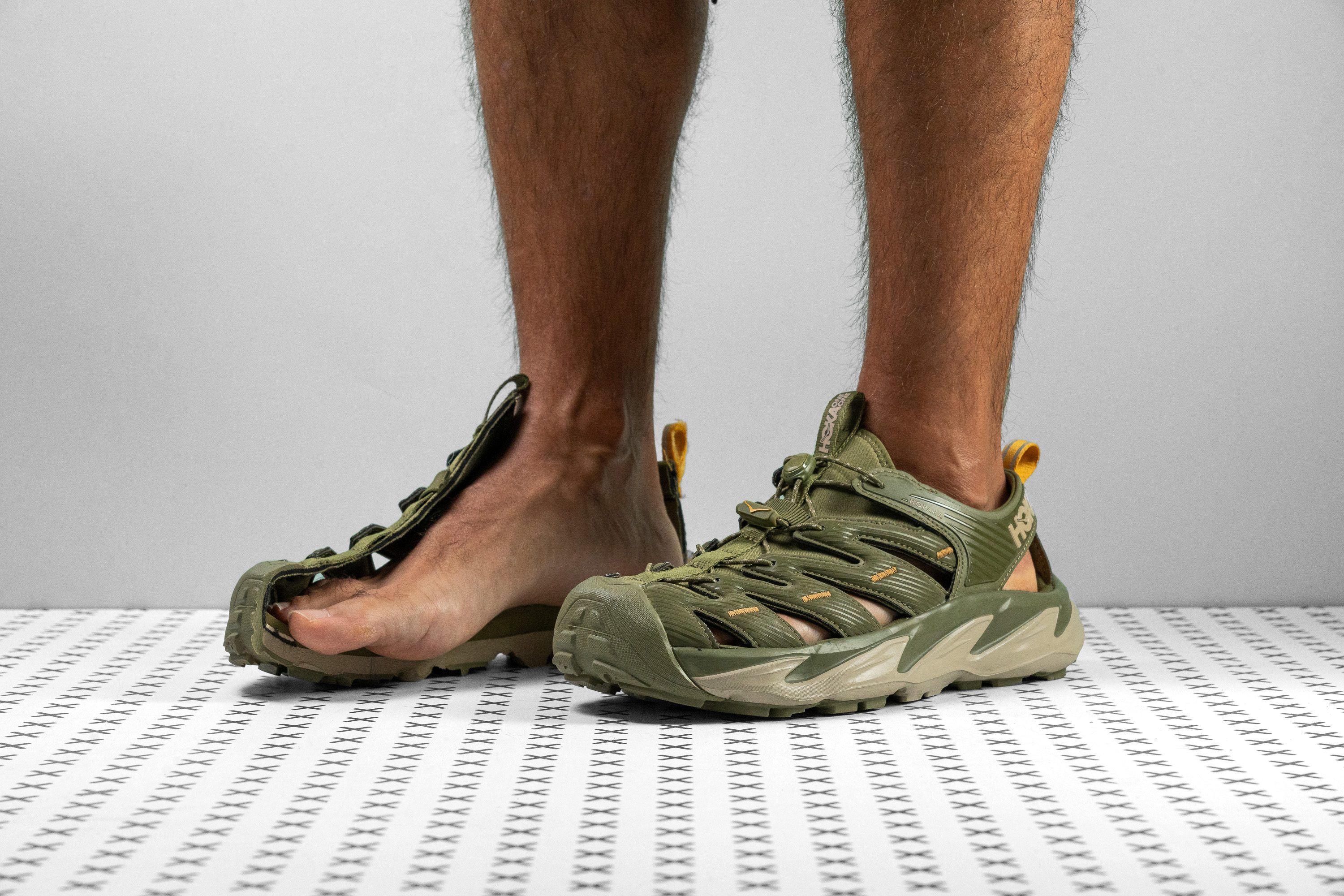Our verdict
- Top pick in best water hiking sandals (2023)
- Top pick in best closed toe hiking sandals (2023)
Pros
- Excellent water drainage
- Odour-free interiors
- Very well cushioned
- Extra wide and stable platform
- Secure foothold
- Plenty of toebox space
- Supreme wet-surface traction
- Highly resistant to abrasion
Cons
- Flimsy heel strap
- Not a light sandal
Audience verdict
Comparison
The most similar hiking sandals compared
+ + Add a shoe | |||||
|---|---|---|---|---|---|
| Audience score | 79 Good! | 82 Good! | 78 Decent! | 89 Superb! | |
| Price | £140 | £105 | £100 | £110 | |
| Trail terrain | LightModerate | LightModerate | LightModerate | Moderate | |
| Shock absorption | - | High | Low | Moderate | |
| Energy return | - | HighModerate | HighModerate | HighModerate | |
| Weight lab Weight brand | 12.6 oz / 357g 12 oz / 340g | 11.6 oz / 329g 12.9 oz / 365g | 11.3 oz / 319g 11.5 oz / 325g | 13.4 oz / 381g 14.2 oz / 403g | |
| Use | Day HikingLight HikingWater hiking | Day HikingLight HikingMulti-sportWater hiking | Day HikingLight HikingMulti-sportUrban hikingWater hiking | Day HikingMulti-sportWater hiking | |
| Construction | Closed toe | Closed toe | Closed toe | Closed toe | |
| Drop lab | 4.2 mm | 3.2 mm | 8.7 mm | 11.0 mm | |
| Size | True to size | True to size | True to size | Slightly small | |
| Midsole softness | Firm | Firm | Firm | Balanced | |
| Stiffness | Stiff | Moderate | Flexible | Stiff | |
| Outsole hardness | Average | Average | Average | Hard | |
| Outsole durability | Good | Good | Decent | - | |
| Outsole thickness | Average | Average | Thick | Average | |
| Lug depth | 3.8 mm | 3.0 mm | 3.3 mm | 4.1 mm | |
| Heel stack lab | 26.8 mm | 26.2 mm | 23.8 mm | 29.4 mm | |
| Forefoot | 22.6 mm | 23.0 mm | 15.1 mm | 18.4 mm | |
| Heel tab | Finger loop | Finger loop | Finger loop | Finger loop | |
| Midsole width - forefoot | Very wide | Wide | Very narrow | Average | |
| Midsole width - heel | Very wide | Very wide | Average | Average | |
| Widths available | Normal | Normal | Normal | NarrowNormalWide | |
| Ranking | #11 Bottom 8% | #8 Bottom 27% | #11 Bottom 1% | #5 Top 46% | |
| Popularity | #5 Top 42% | #3 Top 28% | #4 Top 37% | #1 Top 10% |
Who should buy
The Hopara has what it takes to be your next go-to trail or all-day wear companion. You will appreciate this Hoka offering if you want a sandal that is extremely versatile. it can handle easy-to-moderate hiking, camping, walking, fishing, paddling, swimming, among other activities that involve water.
There is a good reason why "Hopara" is a Maori word for “explore.”
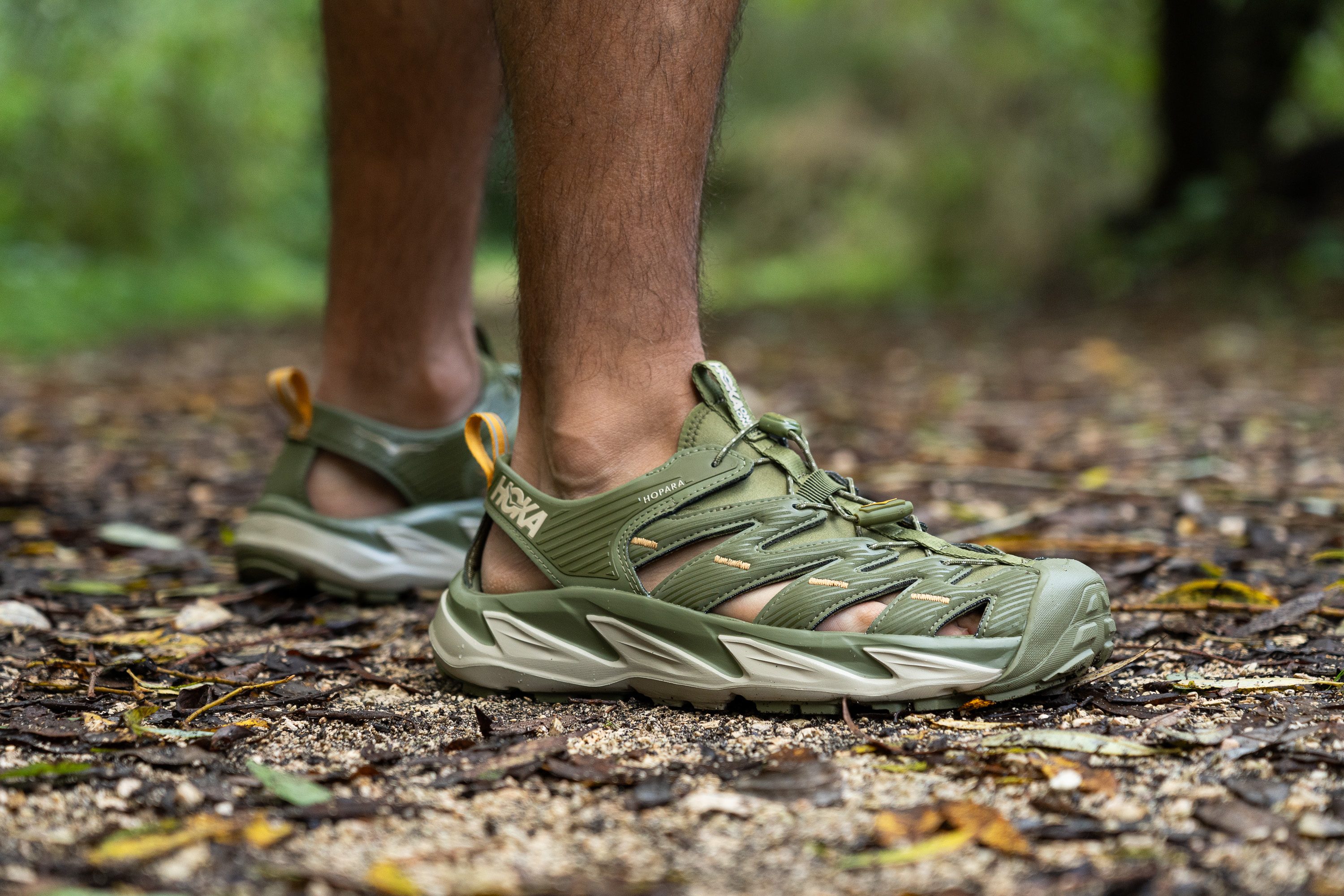
Who should NOT buy
If you'd like to explore a similar closed-toe hiking sandal that is more plush and has a stronger heel strap, we recommend checking out the KEEN Newport H2!
And if you feel like doing some beach/water hiking, you may want a lighter and more laid-back style like the Teva Hurricane XLT2.
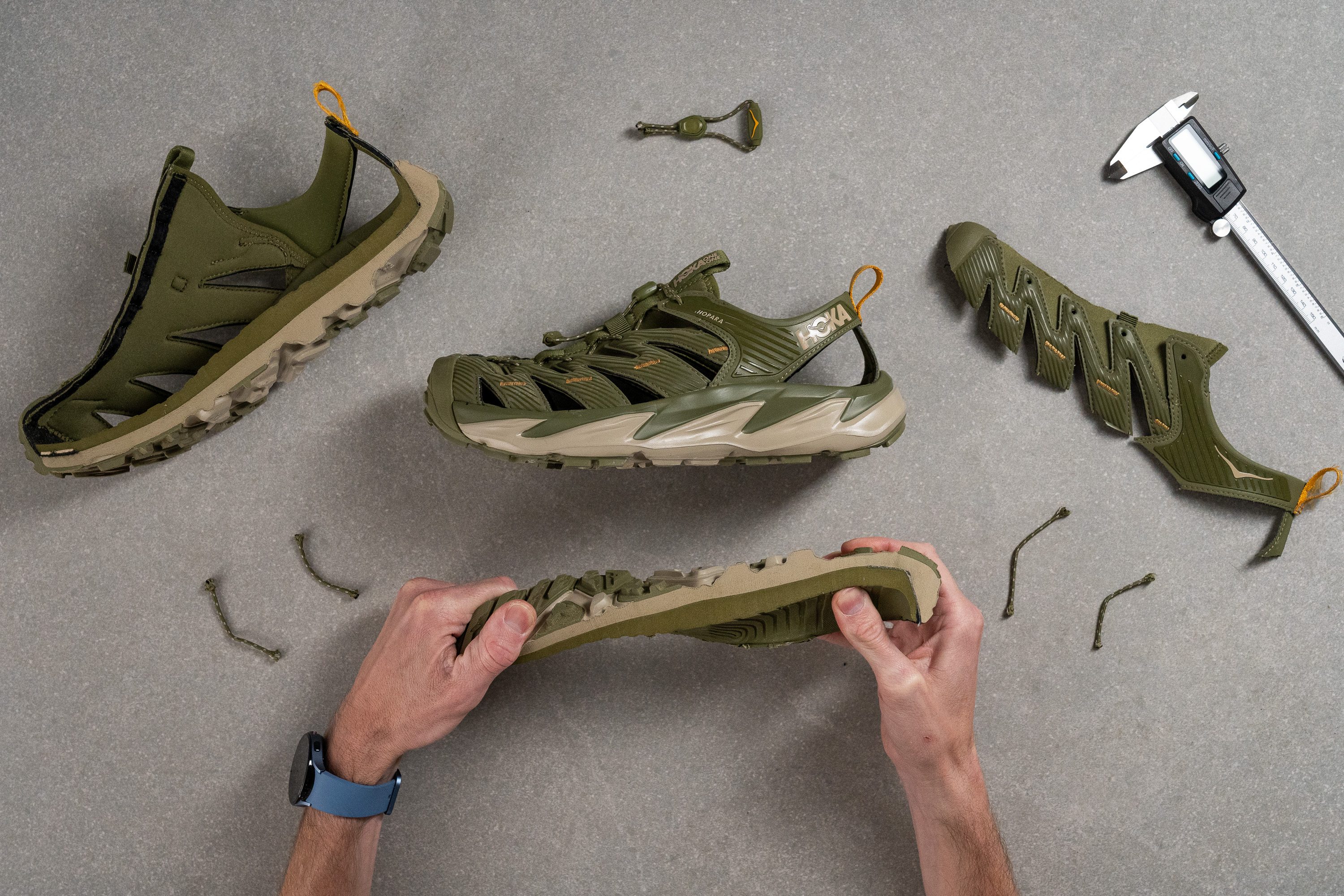
Cushioning
Heel stack
What helps to justify the Hopara's above-average weight is the amount of cushioning that it packs. This sandal is loaded with comfort and to say we are addicted is an understatement!
A generous stack of 26.8 mm under the heel makes it a real joy to wear all day long. Compared to other sandals we've tested, the Hopara is an actual shoe!
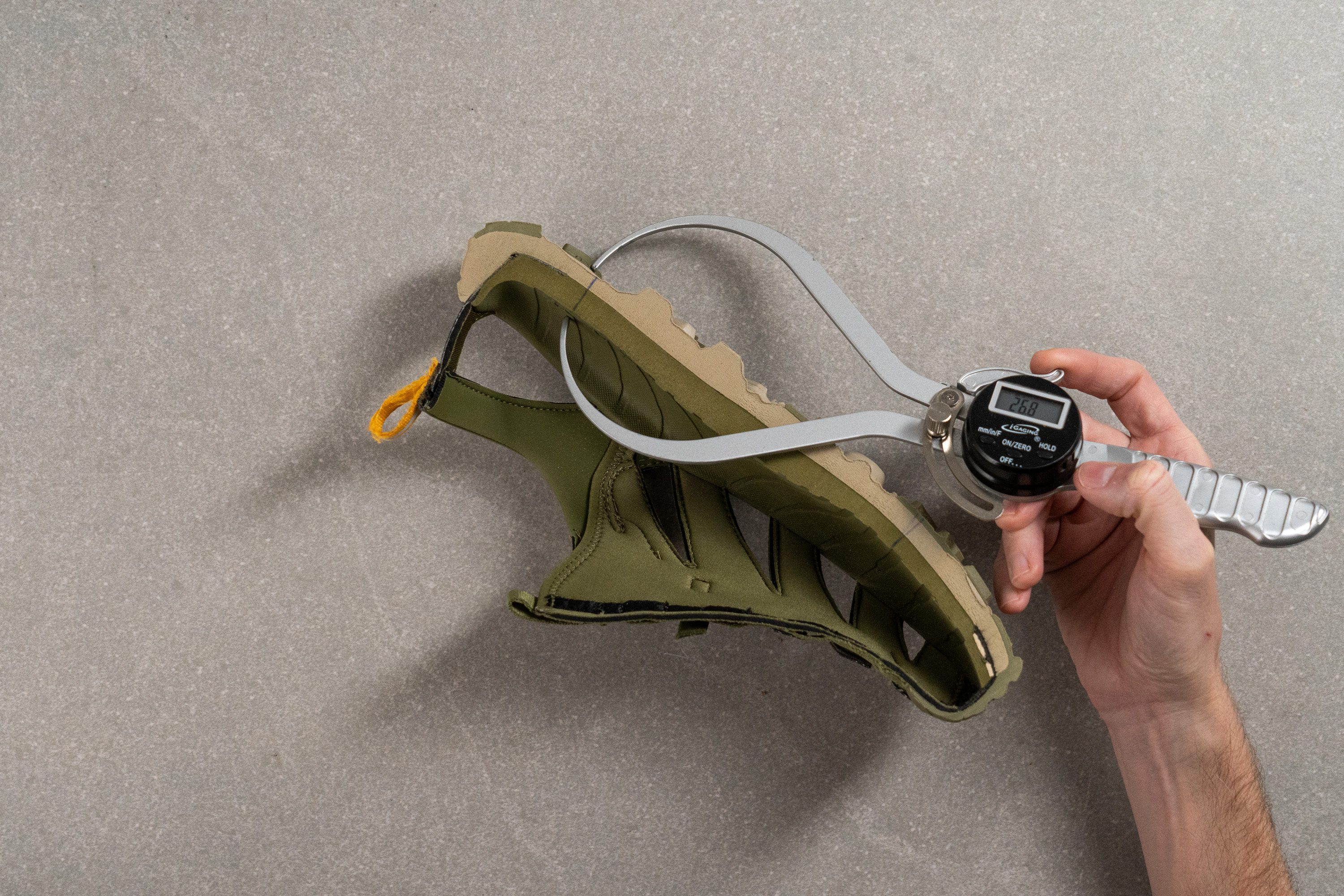
Stepping on almost anything that poked underfoot was never a problem in this Hoka sandal.
| Hoka Hopara | 26.8 mm |
| Average | 26.3 mm |
Forefoot stack
Is this sandal just as massive in the forefoot? Oh, yeah!
With our calliper showing 22.6 mm of stack height, the Hopara once again proves that it is a true Hoka. The brand is famous for its extra-cushioned hiking and running footwear.
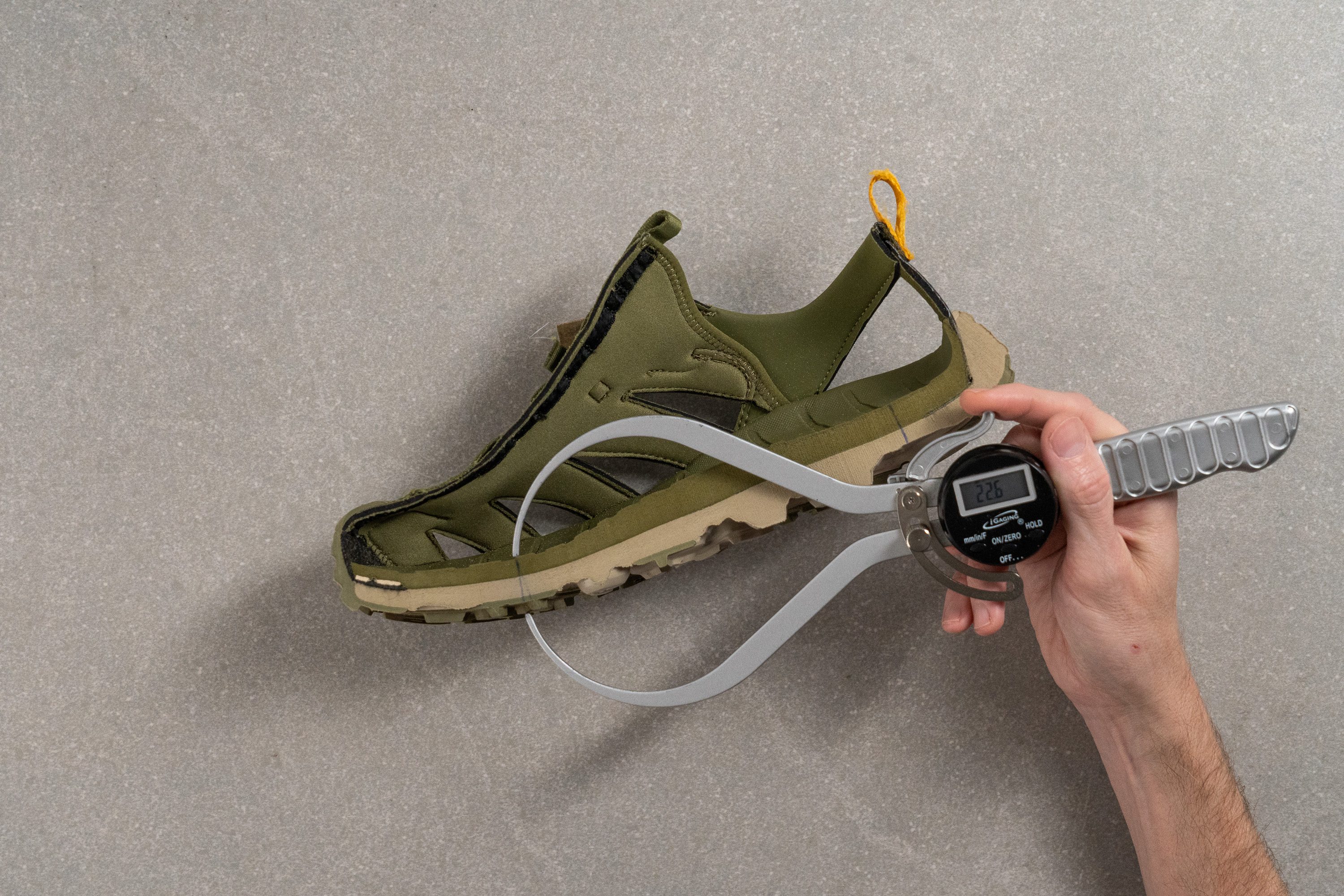
| Hoka Hopara | 22.6 mm |
| Average | 18.5 mm |
Drop
According to the official stats, the heel-to-toe drop of the Hopara is 5 mm. Based on our own measurements, it is even less - 4.2 mm.
In real life, this means that your foot sits nearly parallel to the ground inside the sandal. No significant elevation in the heel.
- The benefit is that you feel more grounded and in control of the footing.
- The drawback is that beginner hikers may feel muscle fatigue faster in low-drop footwear.
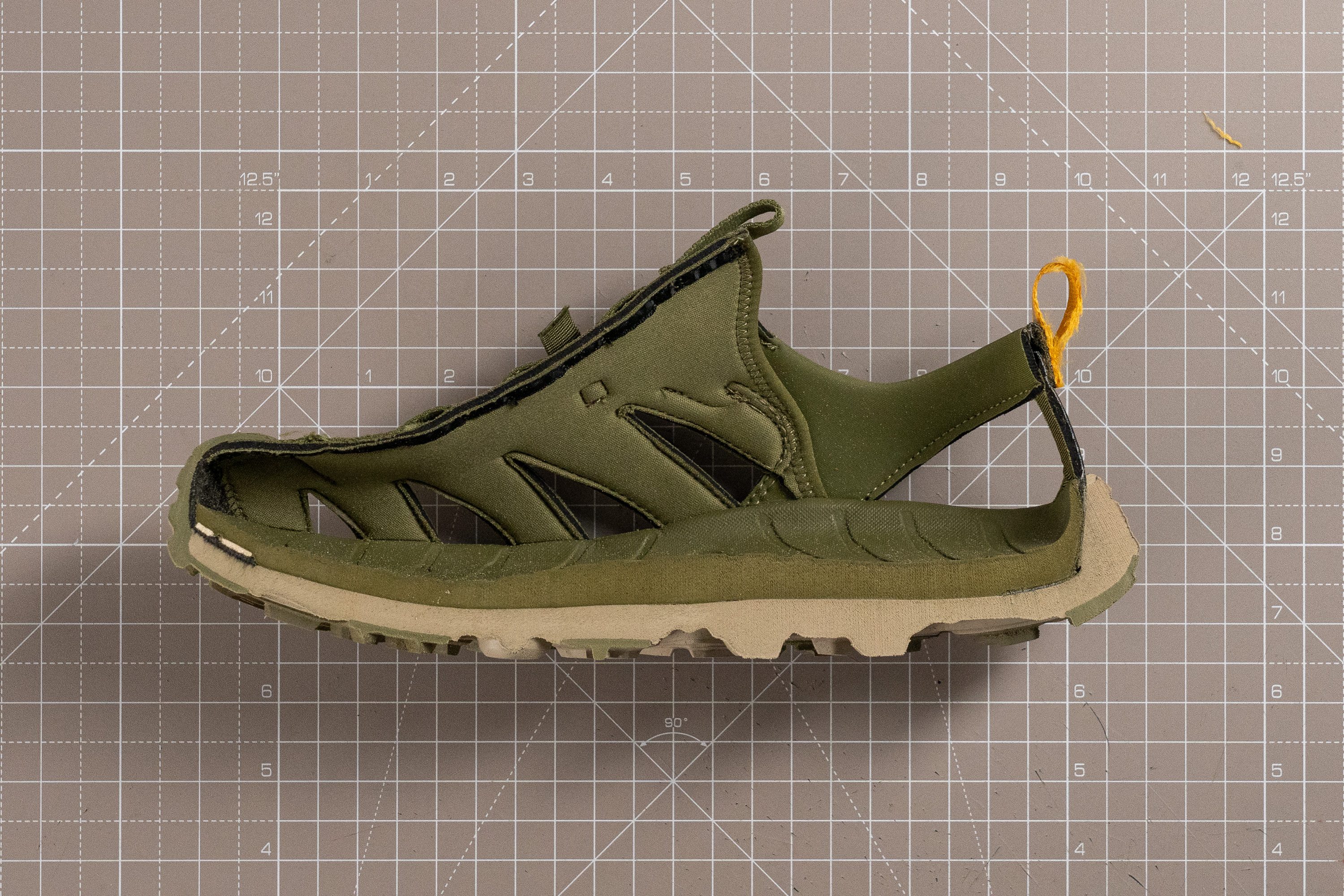
| Hoka Hopara | 4.2 mm |
| Average | 7.8 mm |
Midsole softness
At first look, the Hopara may appear soft and cosy but its rubberized EVA midsole proves otherwise.
Pressing our durometer against the foam, the tool showed 33.6 HA. This is on the firm side of hiking sandals and, for reference, 56% firmer than the Teva Hurricane XLT2!
Some people may wish for a plusher underfoot experience but only until they step on the first sharp rock.
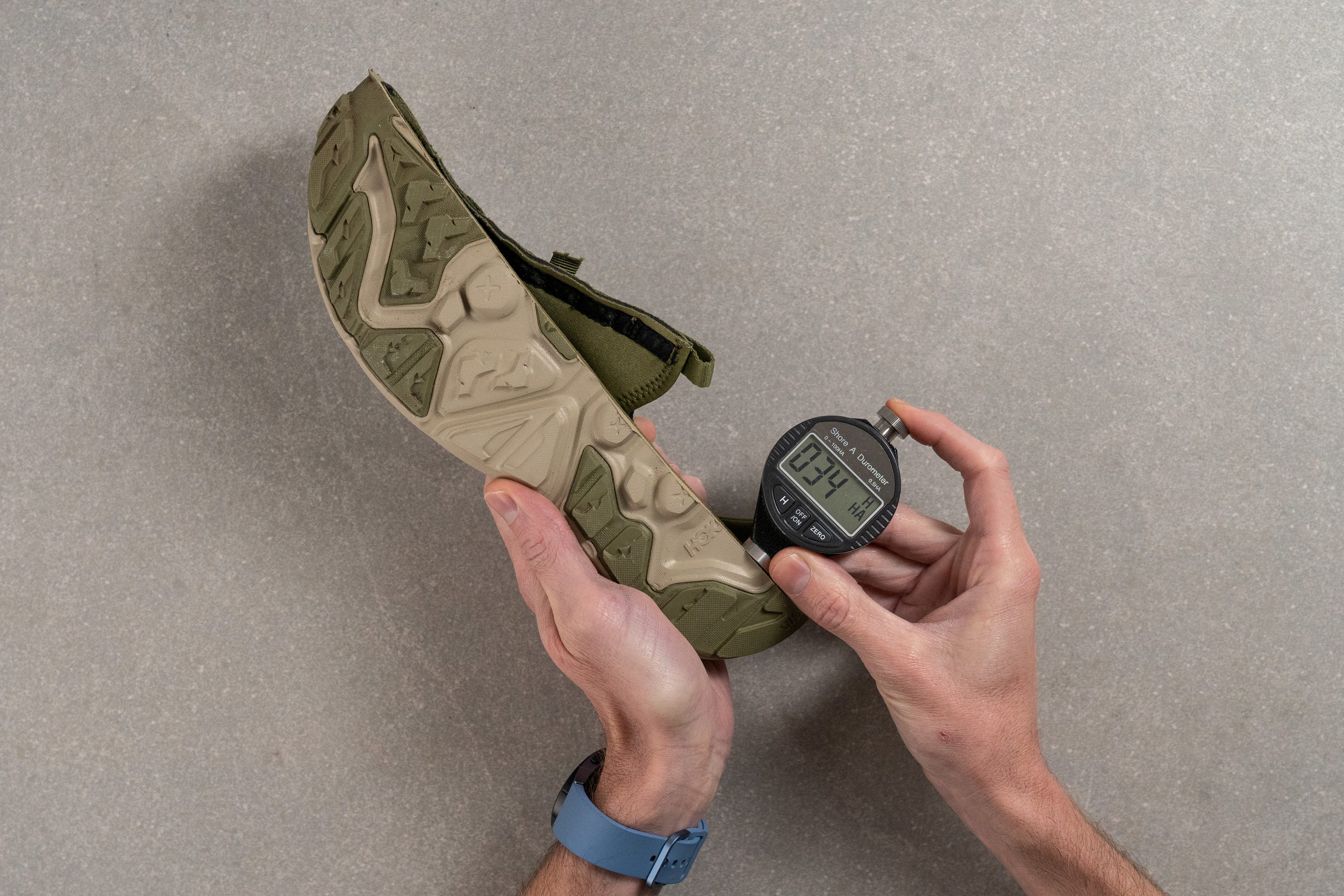
| Hoka Hopara | 33.6 HA |
| Average | 26.1 HA |
Secondary foam softness
But don't worry, the shoe's thick footbed that comes in direct contact with the foot is made of a much softer compound. Showing 20.0 HA on our durometer, it falls into the plush range of cushioning foams.
It balances the firmness of the Hopara's carrier foam brilliantly.
| Hoka Hopara | 20.0 HA |
| Average | 21.9 HA |
Size and fit
Size
Hoka Hopara fits true to size (215 votes).
Internal length
| Hoka Hopara | 264.0 mm |
| Average | 262.8 mm |
Width / Fit
We were elated by the fact that the Hoka Hopara had enough room in the toe area. There is absolutely no squeezing or pinching.
In the widest part of the toebox, our caliper showed 109.4 mm which is significantly wider than average.
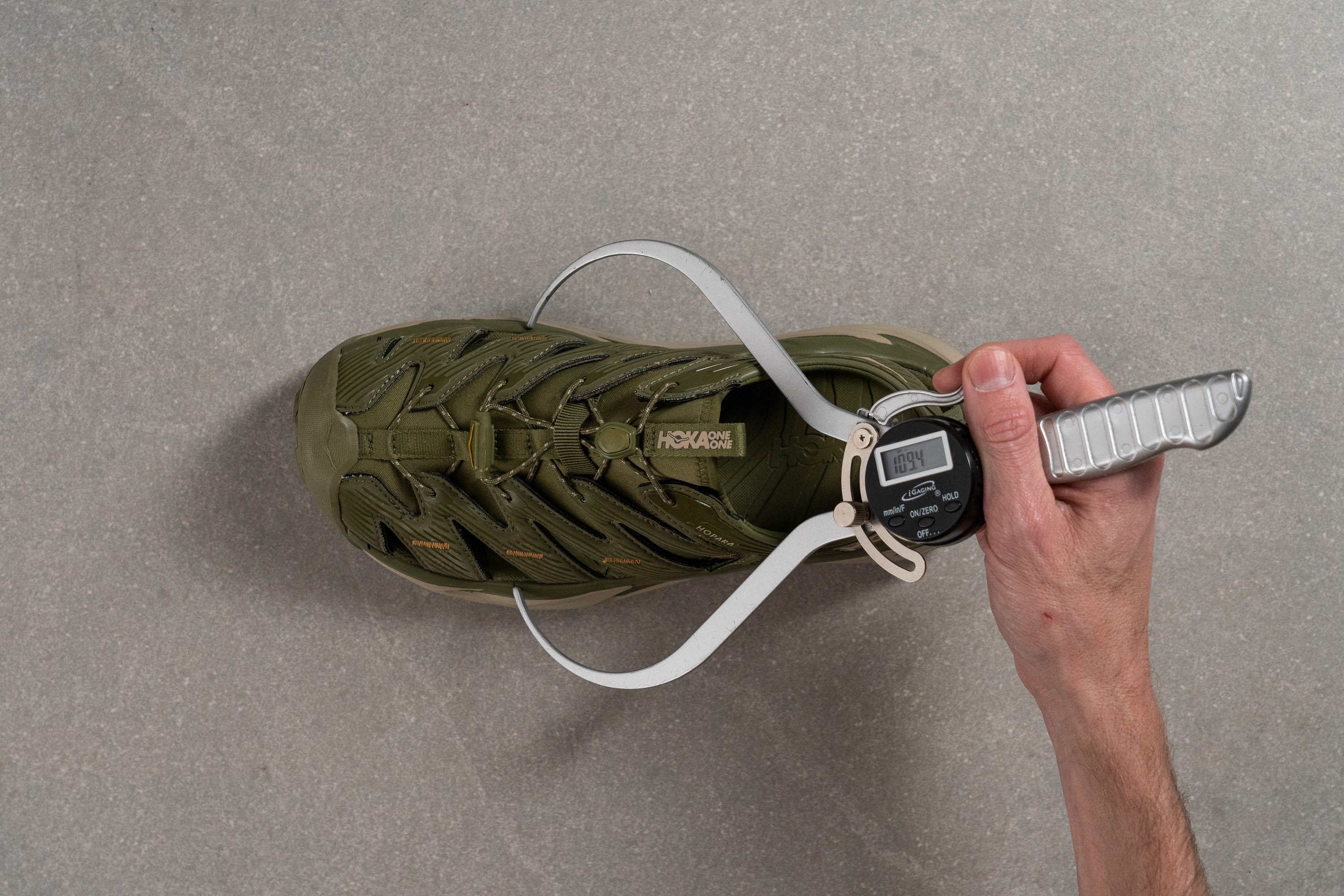
This test follows an older methodology, which is why you don't see recently tested shoes in the chart. Results from different methodologies can not be compared.
| Hoka Hopara | 109.4 mm |
| Average | 102.6 mm |
Quick-lace
To further cinch up the upper, The Hopara used a quick-lace (or bungee) system. We love this type of lockdown mechanism as it is so quick and effortless to adjust.
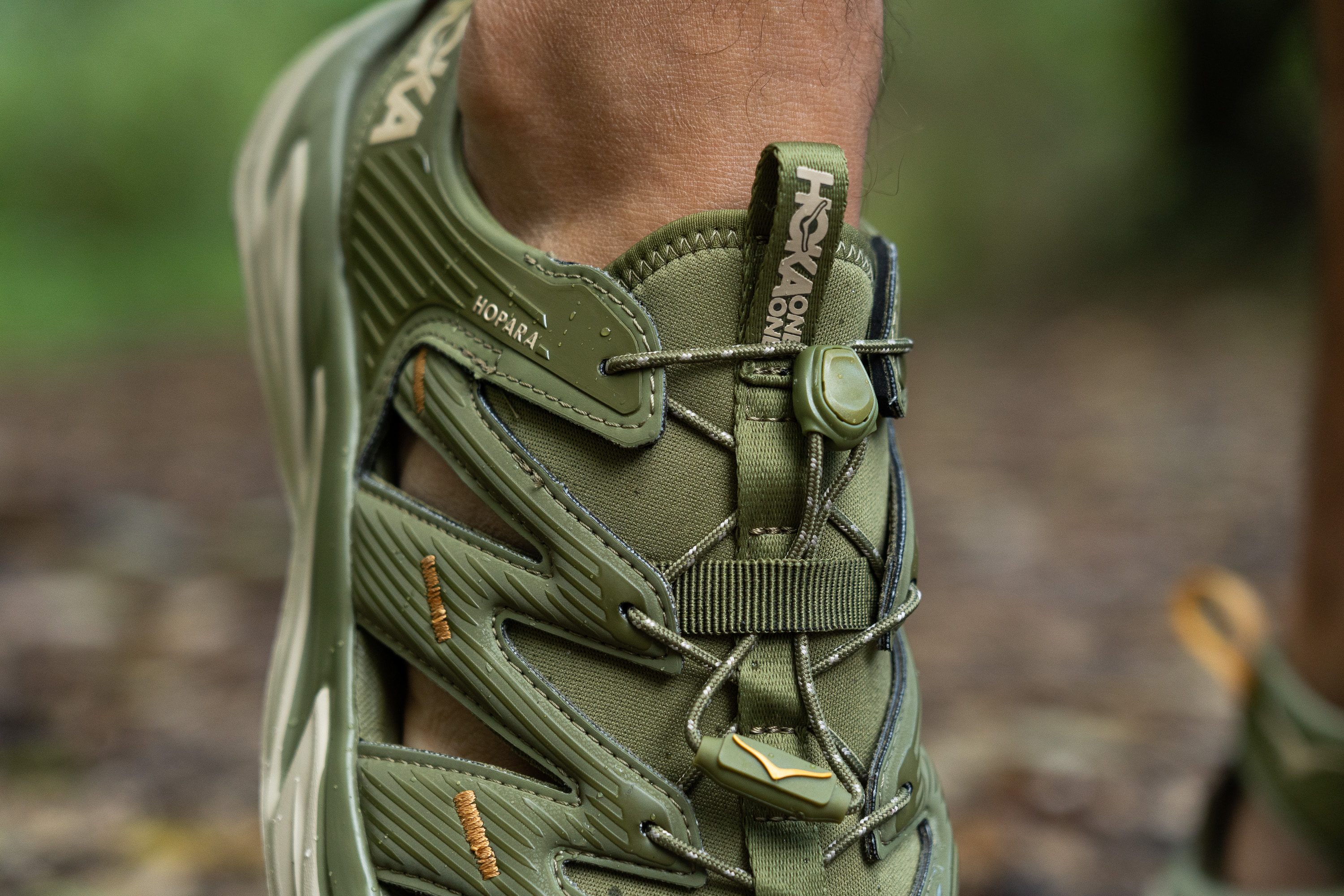
It also comes with a handy lace storage to tuck excess laces away.
Traction / Grip
Lug depth
The Hopara undercuts many of its competitors from Teva, KEEN, and Chaco by having some pretty aggressive lugs. According to Hoka, they are 5 mm deep and it was (almost) confirmed in our calliper measurement (4.8 mm).
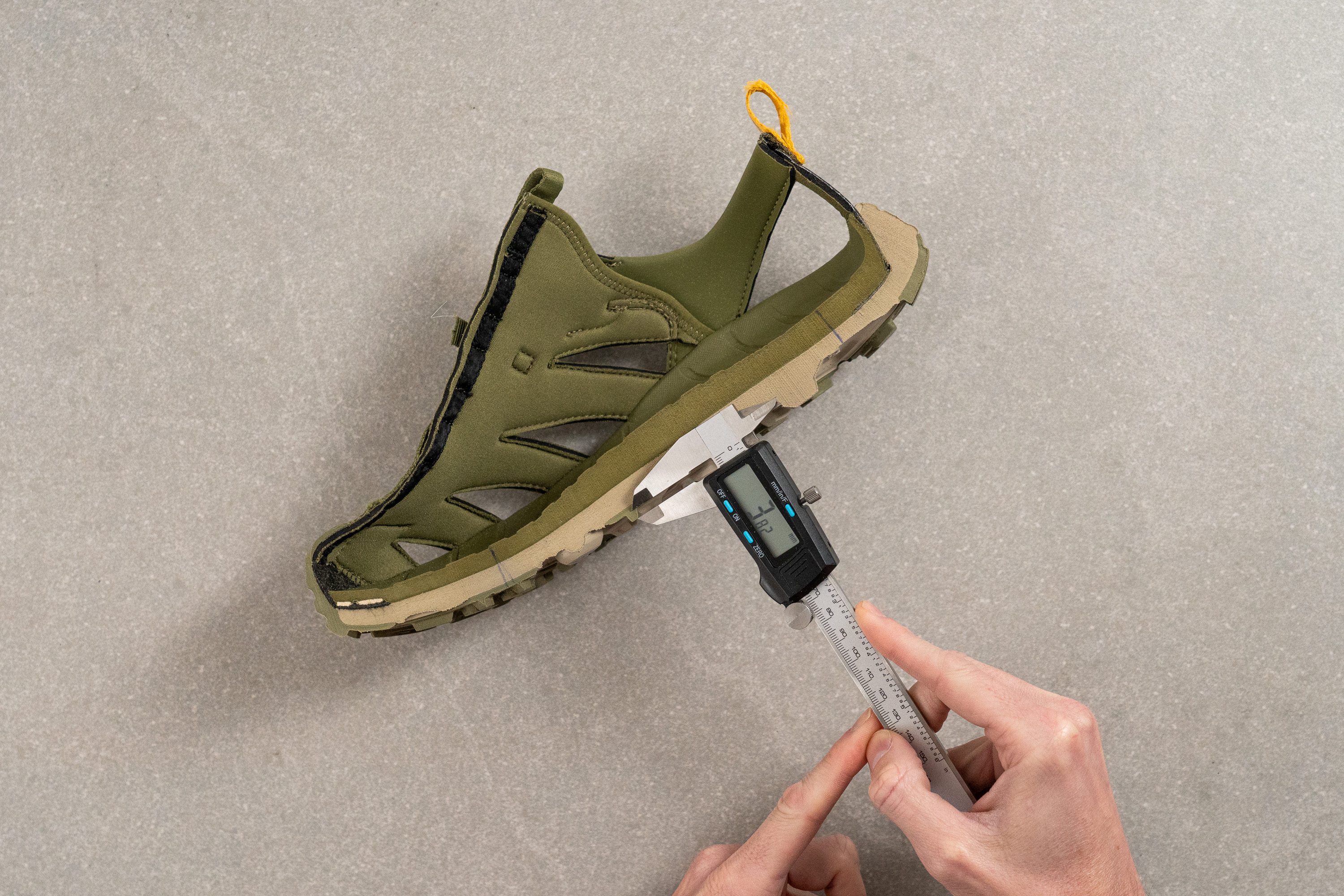
We were ecstatic to finally find a sandal that gives more bite on loose soil. Slippery stones, lava rocks, smooth surfaces - it handles them all, based on our trips.
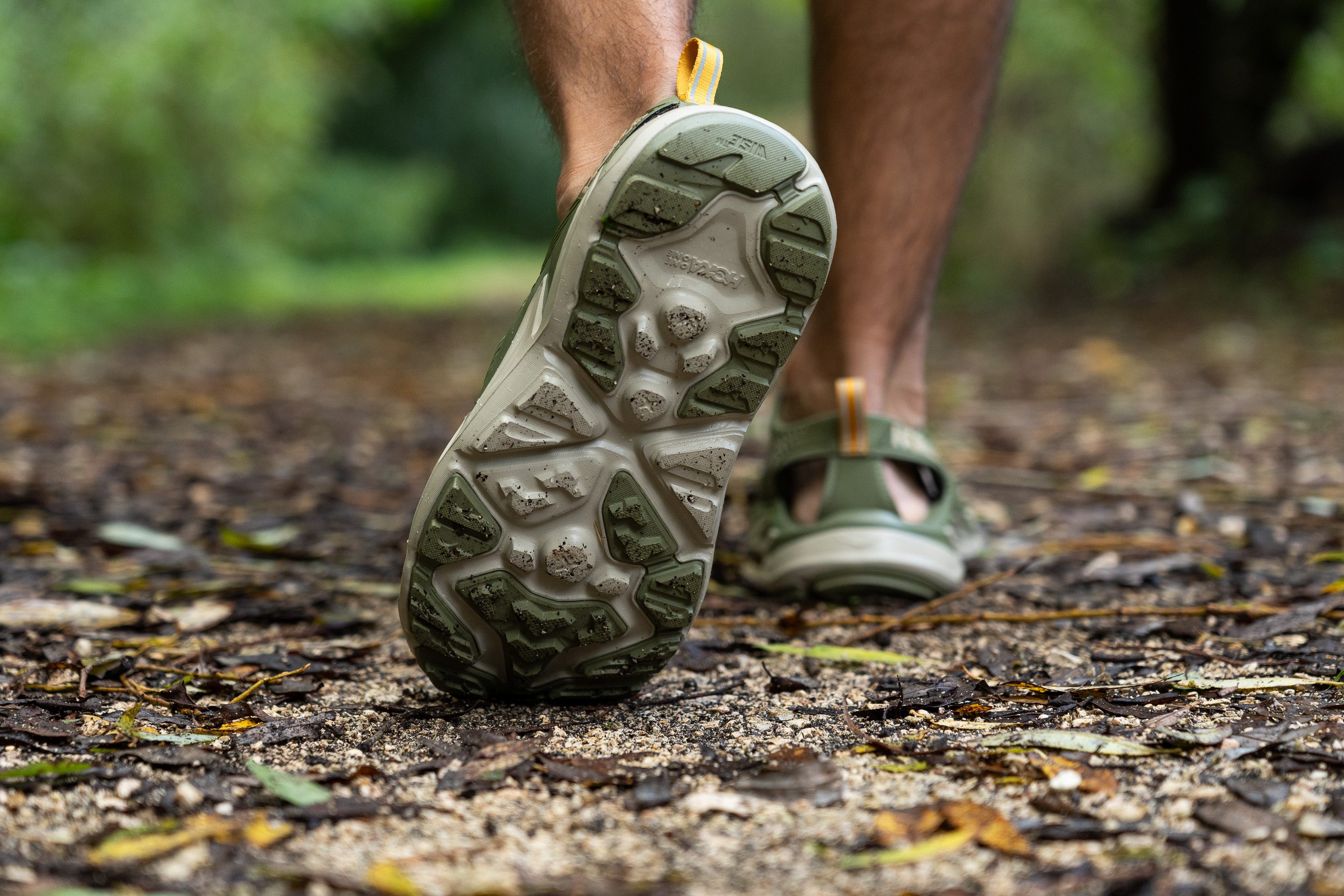
| Hoka Hopara | 3.8 mm |
| Average | 2.9 mm |
Flexibility / Stiffness
You can probably tell by now that it's not easy to bend your foot all the way in the Hoka Hopara.
Using a force gauge, we found that it took 25.1N to get this sandal to a 90-degree angle. This is 40% more than it normally takes a hiking sandal!
Wearing the Hopara, you certainly compromise ground feel and natural movement. But you do get plenty of cushioning and protection in return.
This test follows an older methodology, which is why you don't see recently tested shoes in the chart. Results from different methodologies can not be compared.
| Hoka Hopara | 25.1N |
| Average | 22.4N |
Weight
The Hoka Hopara is a burly sandal for sure. It even feels off to refer to the Hopara as "sandal." Just like most closed-toe sandals, it is basically a hiking shoe with drainage.
Tipping the scale at 12.6 oz (357g) in a men's US 9, it sure is heavier than most sandals. But to be fair, its close competitor, the KEEN Newport H2, is even heavier at 13.4 oz (381g).
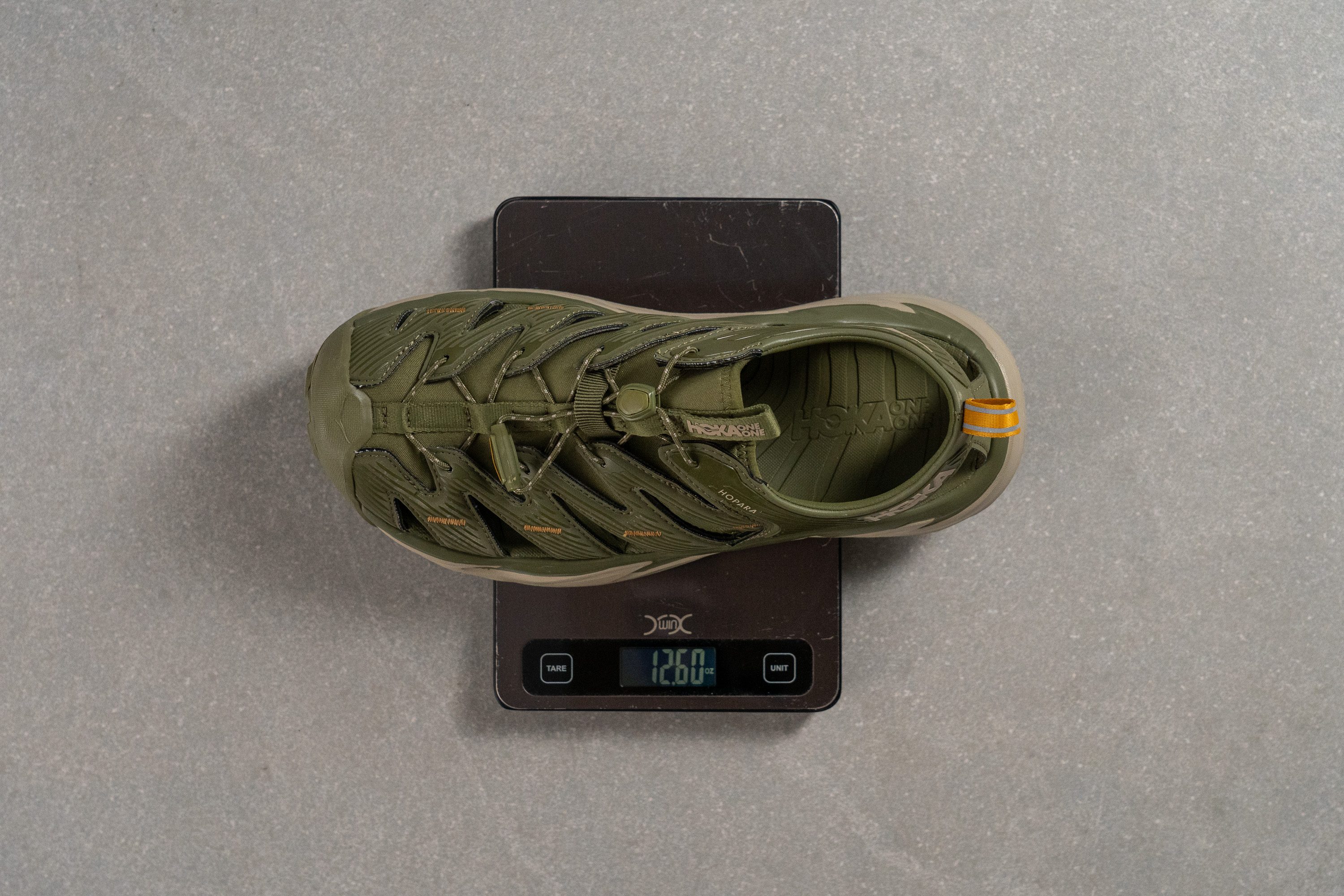
| Hoka Hopara | 12.6 oz (357g) |
| Average | 11.0 oz (313g) |
Stability
Lateral stability test
Apparently, this hiking sandal from Hoka has never heard of ankle rolls. It made us feel exceptionally stable all throughout the hike test, especially on rocky and uneven terrain.
Torsional rigidity
It took a little twist with our hands to reveal the sandal's fairly stiff platform. Thick, firm, and wide, it can't be bent so easily!
This convinced us to rate this Hoka sandal's torsional rigidity with an above-average score of 3/5. No wonder the Hopara feels so stable and supportive underfoot!
| Hoka Hopara | 3 |
| Average | 2.6 |
Midsole width - forefoot
Next time you see a Bigfoot's footprint on the trail, don't get too excited. It probably came from a fellow Hoka wearer.
The sandal's landing area is absolutely massive. Measuring the widest part of the forefoot with a durometer, we got 125.1 mm which is much wider than average.
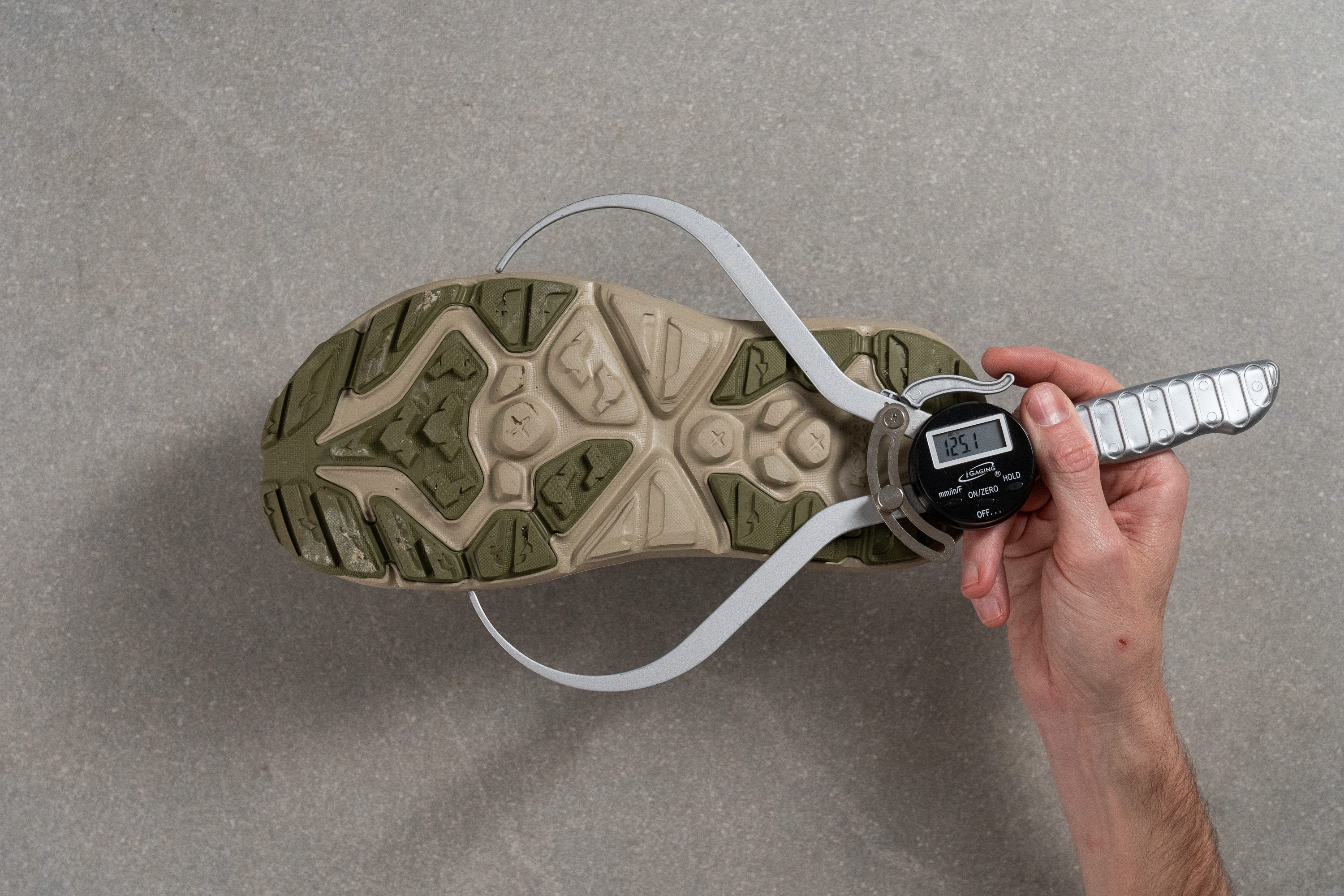
| Hoka Hopara | 125.1 mm |
| Average | 119.0 mm |
Midsole width - heel
Meanwhile, in the widest part of the heel, our calliper showed a whopping 100 mm! That's a whole centimetre wider than average.
Having so much sole to fall back on made our steps surefooted when going downhill and hopping in between rocks.
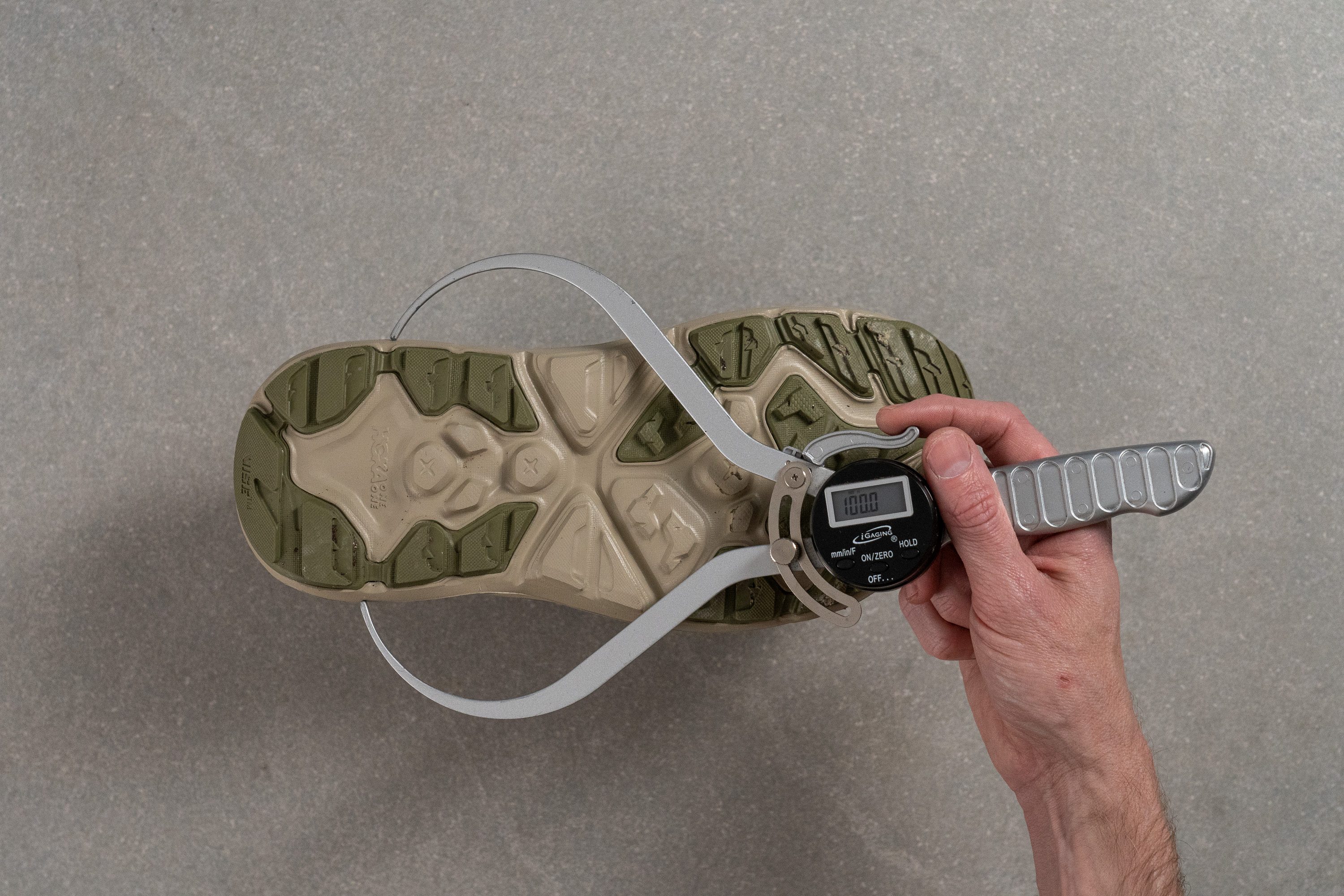
| Hoka Hopara | 100.0 mm |
| Average | 91.6 mm |
Durability
Toebox durability
Hoka takes toe protection very seriously in its closed-toe Hopara sandal. It's hard to ignore the humongous toe bumper and extra thick overlays of this model.
To test exactly how resistant the Hopara is to abrasion, we resorted to our trusty Dremel. After 12 seconds of drilling the toebox at a consistent speed (5K RPM) and pressure (3.2N), we were thrilled with the result!
It not only looks aggressive but is also ready to hold the blow! Looking at the minor damage on the rubber, the Hopara made us more confident about bumping into rocks and other immovable hazards.
Compared to what the same Dremel test can do to other types of outdoor shoes, the Hoka Hopara deserves a maximum 5 out of 5 for toebox durability.
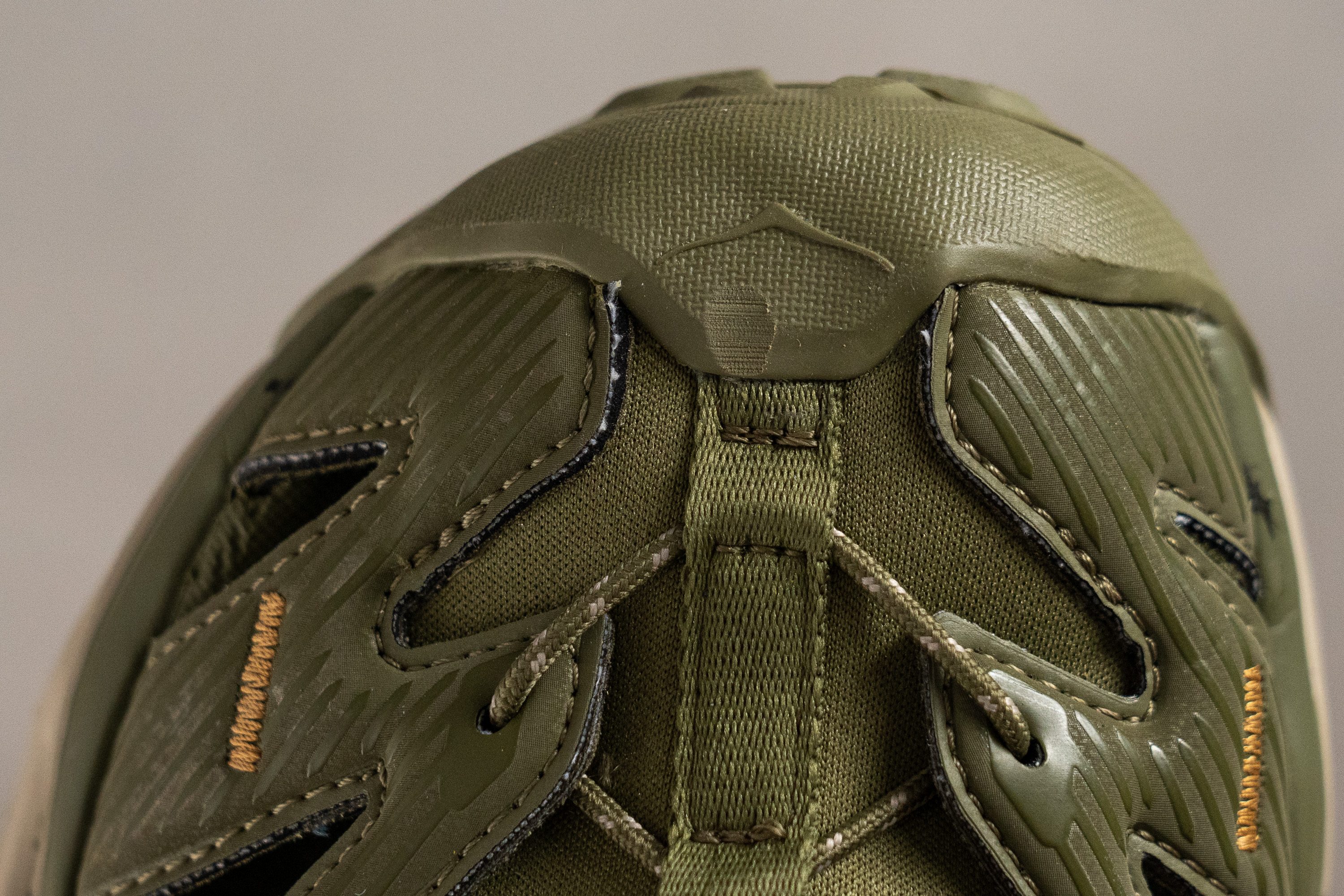
Heel padding durability
The sandal also showed off its sturdy lining inside the heel strap. Drilling it for 4 seconds at a 5K RPM speed resulted in just a tiny scratch.
If we only consider the lining, it deserves a high score of 4 out of 5.
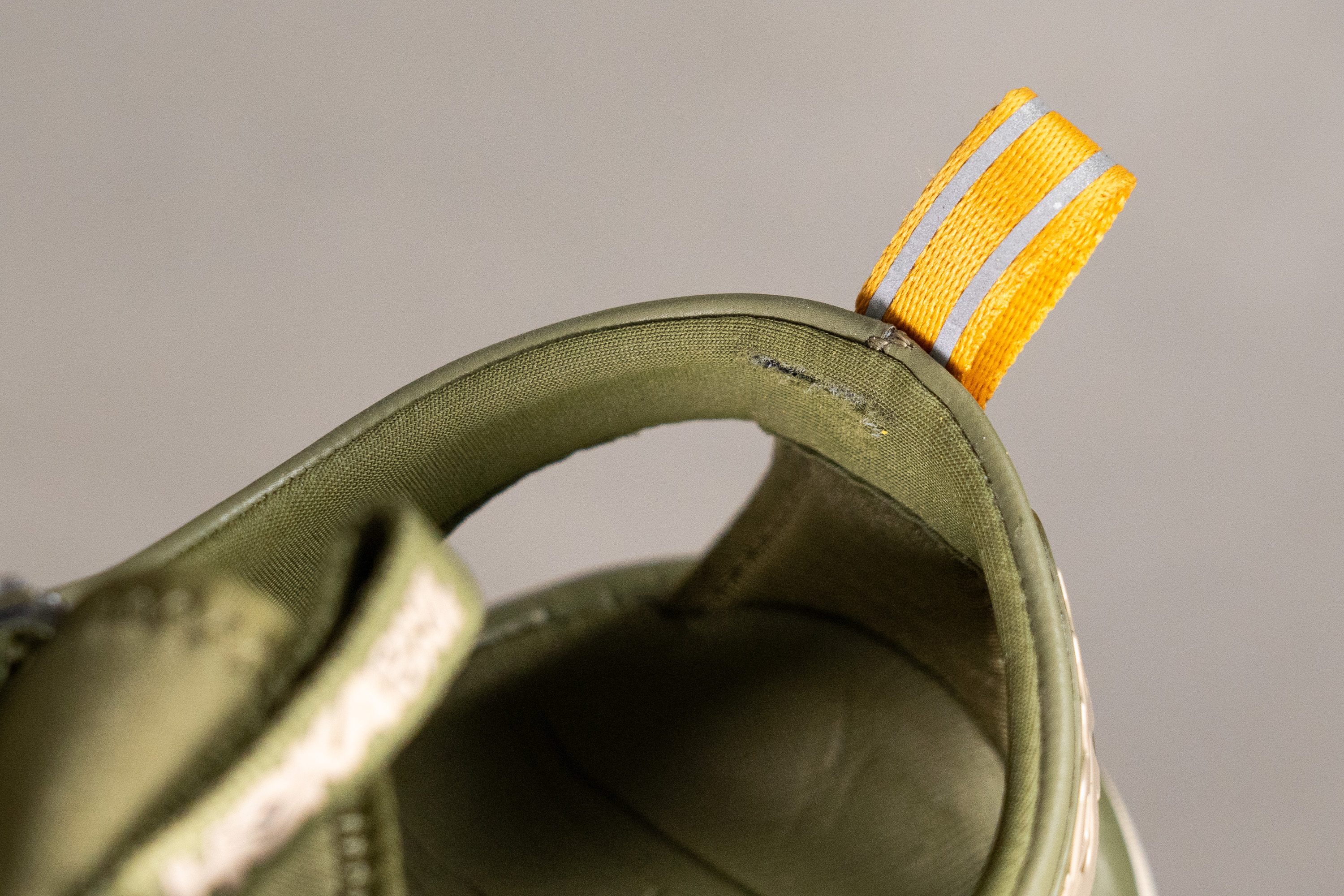
But there is a caveat....The stitching on this heel strap is not very reliable which is very likely to result in an unfortunate tear. This risk is especially high if you pull the finger loop too hard when getting the Hopara on.
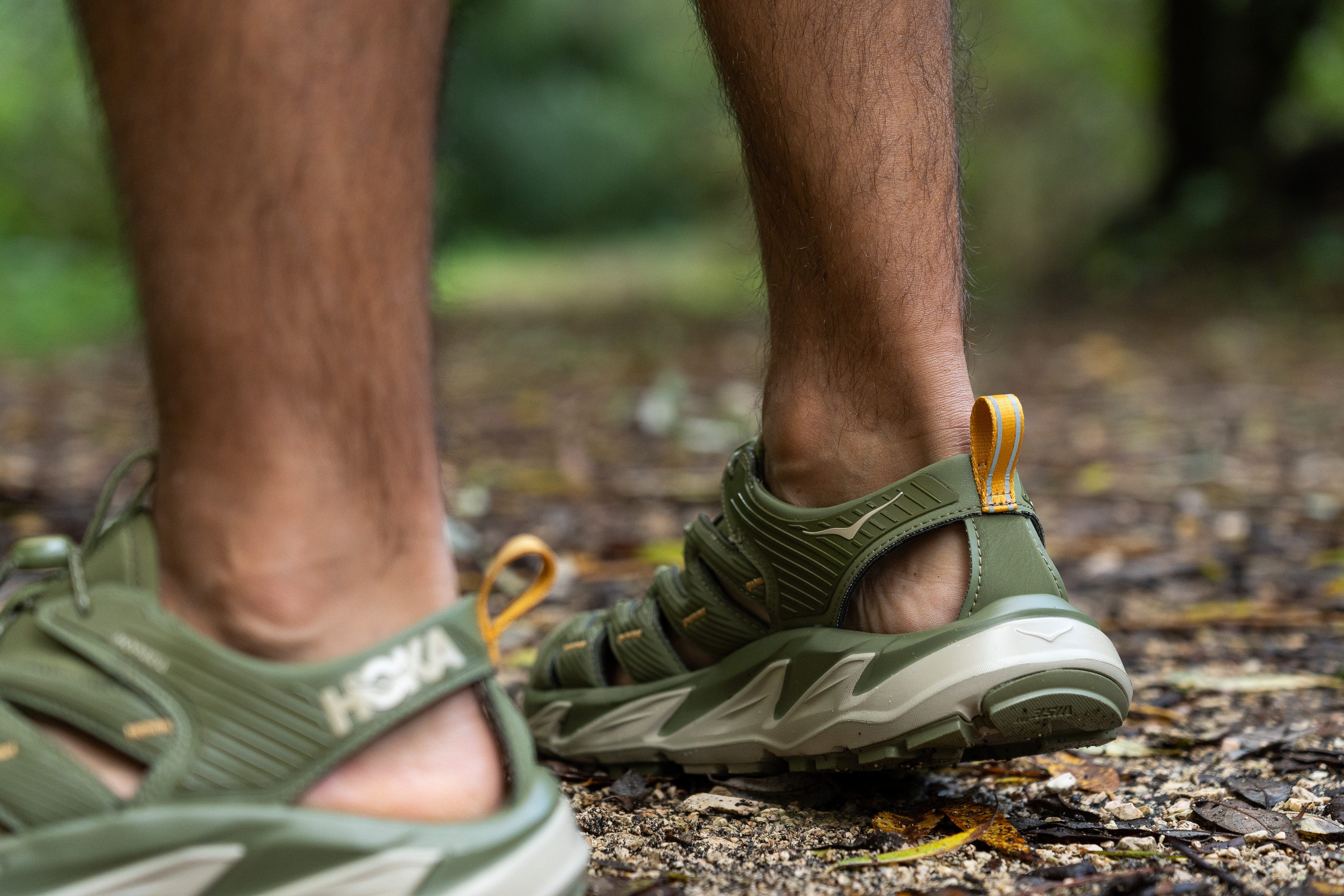
If you don't want to come across this potential problem, you may want to go for the better reinforced KEEN Newport H2.
Outsole hardness
Even though the Hopara is only partially covered with rubber, the quality of that rubber is on par with some hiking boots!
Just by feeling its hardness, we can anticipate a longer-than-average life for this Hoka sandal. Our durometer shows 81.0 HC, which is notably firmer than average.
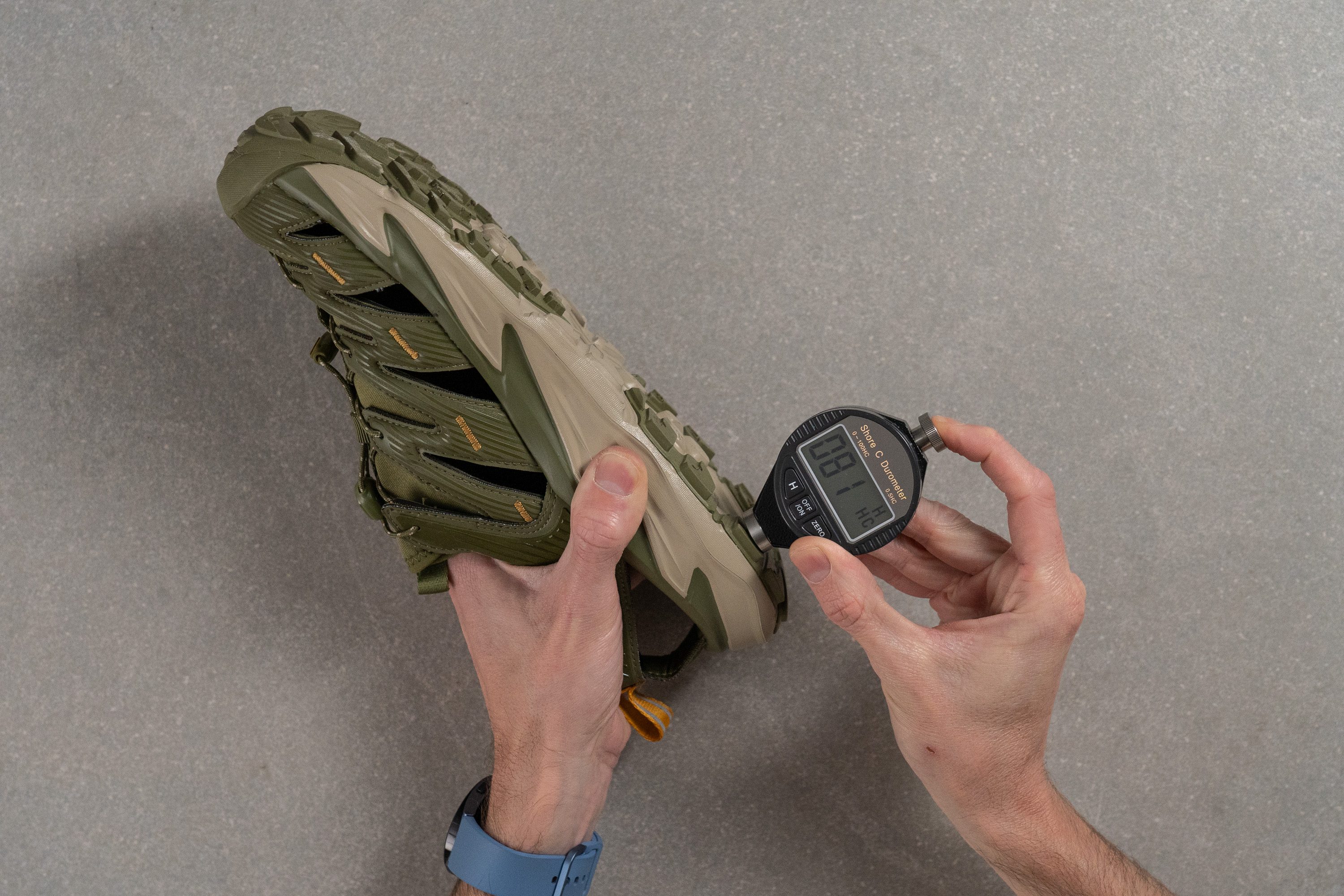
| Hoka Hopara | 81.0 HC |
| Average | 80.5 HC |
Outsole durability
Indeed, the outsole of this sandal showed tremendous results in our Dremel durability test.
Having applied the tool for 22 seconds at an unforgiving speed of 10K RPM, the damage was nearly cosmetic! Where most sandals lose at least 1 mm of rubber, the Hopara only lost 0.5 mm, based on our tread gauge.
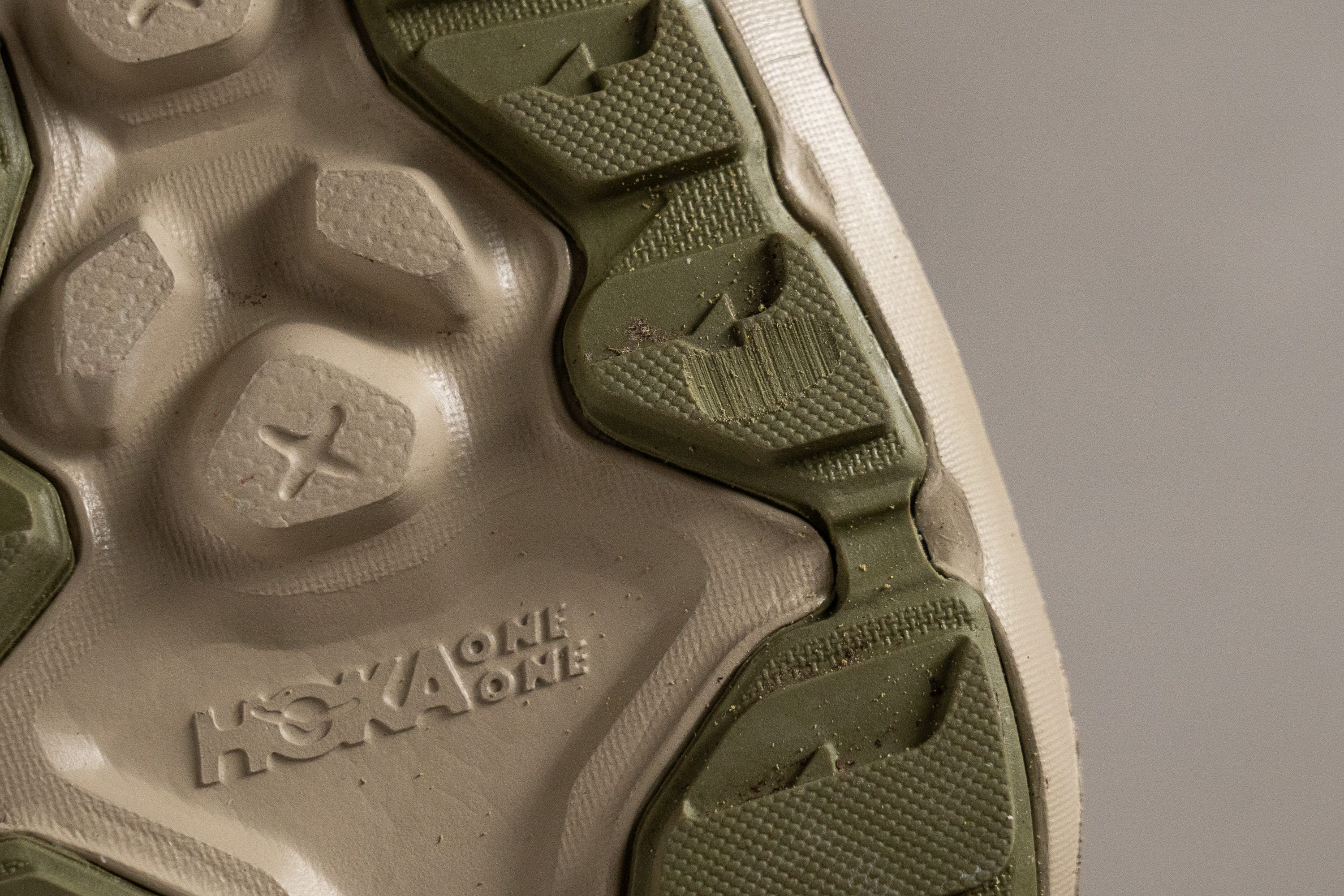
This finding proves that the Hoka Hopara is a trail-ready option and not just a beach flip-flop!
| Hoka Hopara | 0.5 mm |
| Average | 1.5 mm |
Outsole thickness
As our calliper shows, the rubber layer of the Hopara is also thicker than the average of hiking sandals. At 3.0 mm without the lugs, it has a lot of outsole to wear through before this sandal screams for replacement.
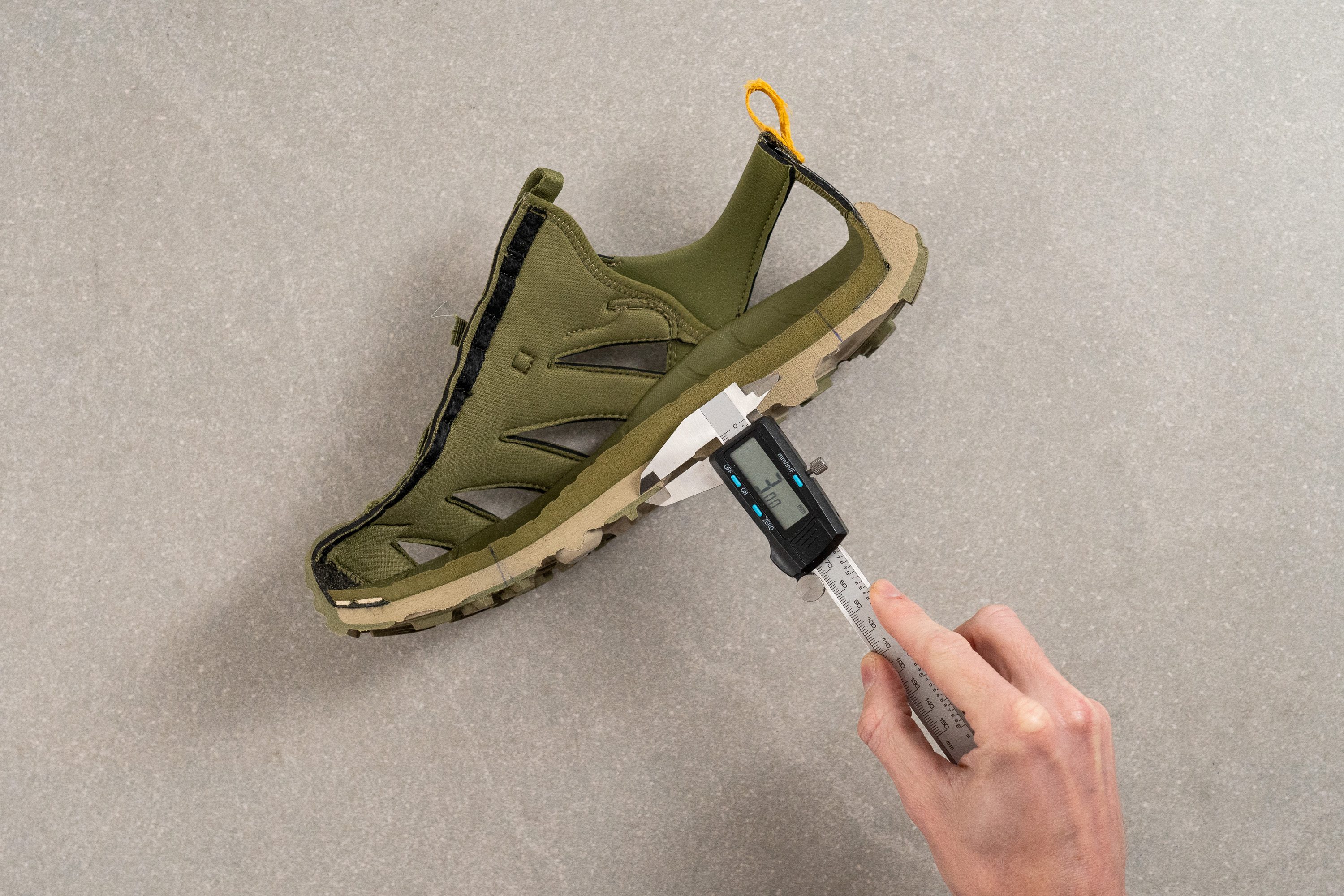
| Hoka Hopara | 3.0 mm |
| Average | 2.5 mm |
Misc
Reflective elements
This Hoka sandal features very small yet important reflective strips on the heel loops. You can see them reflect the light back in the dark.
| Hoka Hopara | Yes |
Upper material thickness
The neoprene tongue of the Hopara is quite thin. We measured it at only 2.7 mm.
This is a welcome bonus for those who don't like too much material on top of the foot in their sandals.
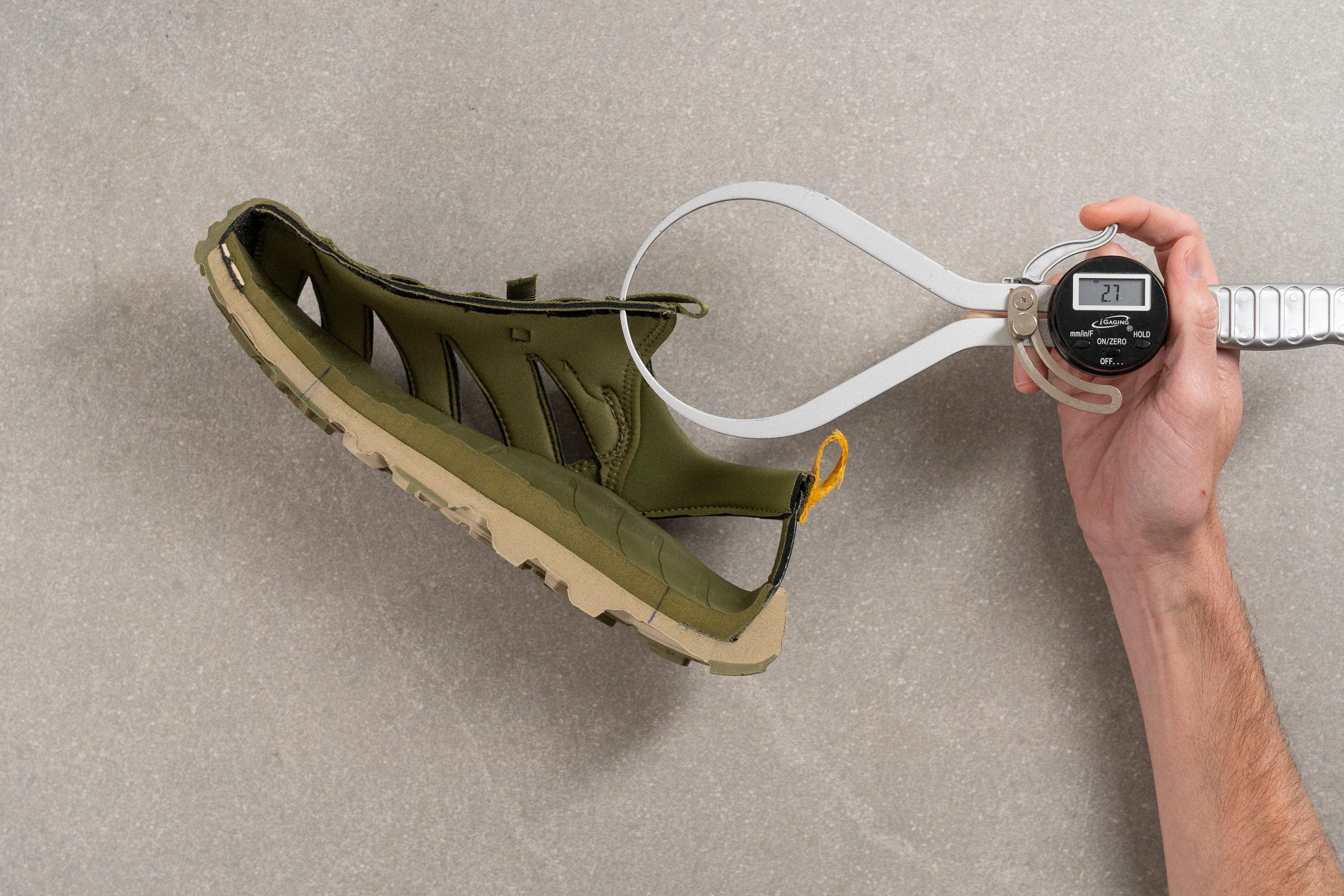
| Hoka Hopara | 2.7 mm |
| Average | 4.3 mm |
Heel tab
The sandal comes with two finger loops - one on the tongue (with the HOKA logo) and the other one on the heel strap.
But do be careful with the back loop. We found that pulling it too hard can result in ripping the strap altogether!
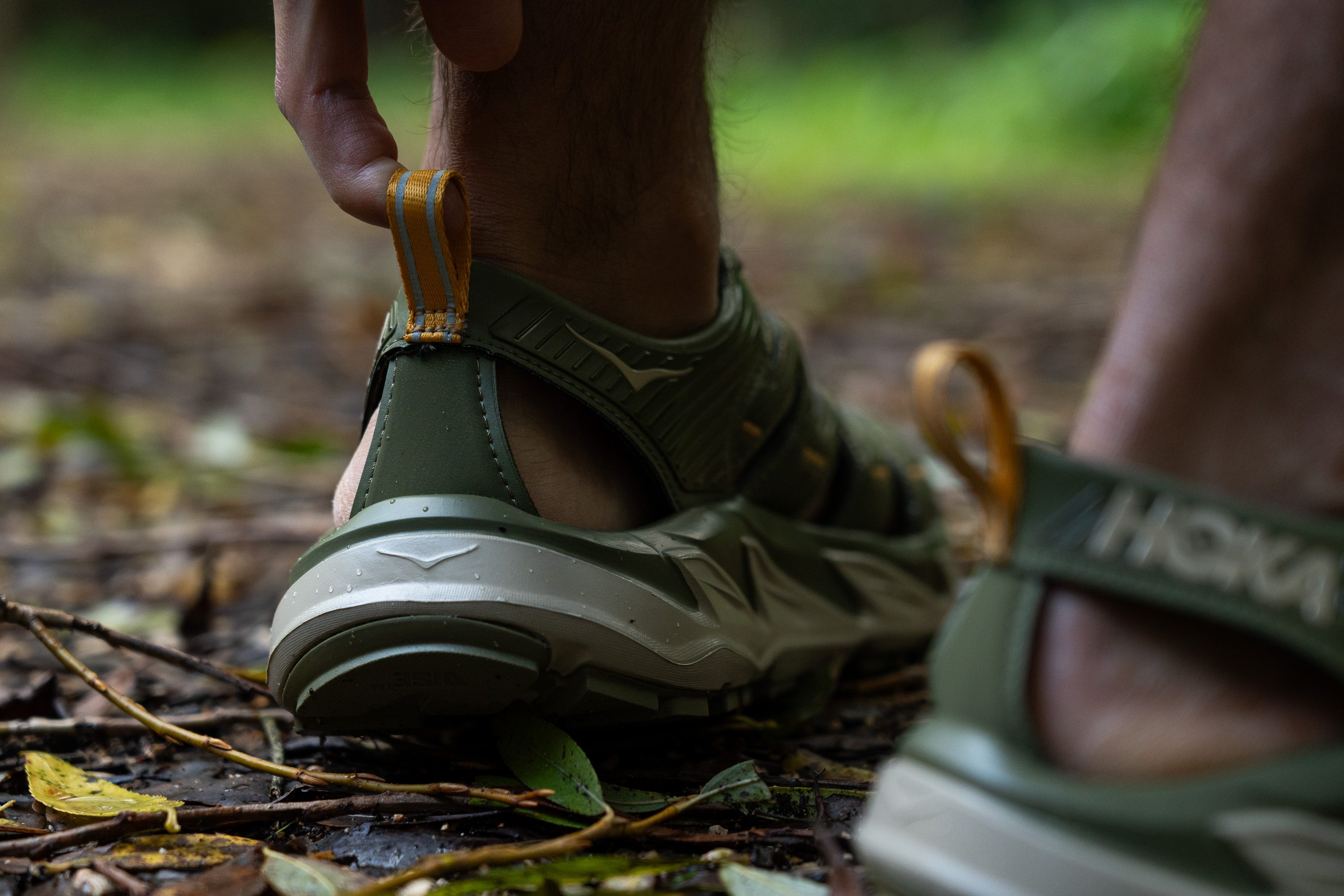
| Hoka Hopara | Finger loop |
Water drainage
Ready for some serious plunges, the Hopara features wide cutouts on the sides and at the back for the water to escape.
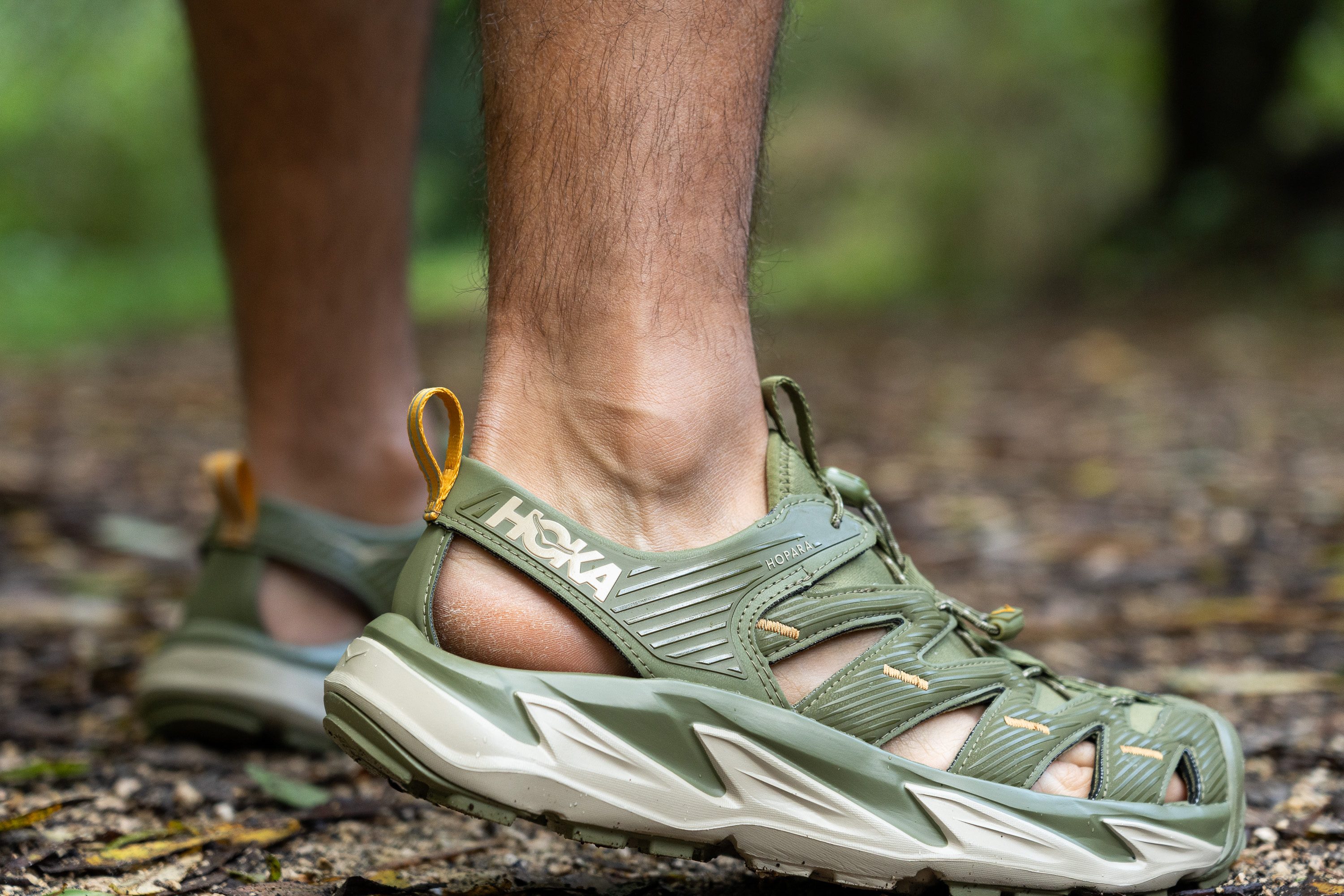
We found the drainage to be very effective in this sandal and were also pleased that it remained odour-free.

